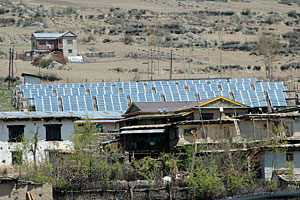 KIRAN PANDAY |
To meet the ambitious but popular goal to reduce carbon dioxide emissions by three fourths by 2100, non-carbon-based sources of energy would have to be an astounding 2.5 times greater in 2100 than the level of total global energy consumption was in 2000. At our current rate of technological development we won't meet this goal in time.
Policymakers, and especially politicians in Copenhagen this December, should abandon fraught carbon-reduction negotiations, and instead make agreements to invest in research and development to get this technology to the level where it needs to be. Not only would this have a much greater chance of actually addressing climate change, but it would also have a much greater chance of political success since the biggest emitters today, India and China, will much prefer to embrace technological innovations than costly carbon caps.
Today's politicians focus narrowly on how high a carbon tax should be to stop people from using fossil fuels. That is the wrong question. The market alone is an ineffective way to stimulate research and development into uncertain technology, and a high carbon tax will simply hurt growth if alternatives are not ready.
Investing about $100 billion annually in non-carbon-based energy research would mean that we could essentially fix climate change on the century scale. Research shows that for every dollar spent this approach would avoid about $11 of climate damage, while strong and immediate carbon cuts would be more expensive but achieve as little as $0.02 of avoided climate damage.
If we don't shift our attention to developing technologies, there is only one possible outcome: virtually no climate impact, but a significant dent in global economic growth, with more people in poverty, and the planet in a worse place than it could be.
Bjorn Lomborg is the author of The Skeptical Environmentalist and Cool It, head of the Copenhagen Consensus Center, and adjunct professor at Copenhagen Business School.
"New leadership, not technology"
Inter Press Service environmental correspondent Stephen Leahy recently spoke with Lester Brown, founder and President of the Washington-based Earth Policy institute, on the launch of his new book, Plan B 4.0: Mobilizing to Save Civilisation.
IPS: You are calling for global carbon reductions of 80 per cent by 2020. That's far, far more than what any country is proposing to do right now.
LESTER BROWN: We looked at how much of a cut is necessary to avoid the most dangerous effects of climate change, not at how much is politically feasible.
Is such a huge global reduction in emissions even possible?
It will take a worldwide mobilisation at wartime speed. First, investing in energy efficiency will allow us to keep global energy demand from increasing and then we must cut carbon emissions by one third, replacing fossil fuels with renewable energy sources. A further 36 per cent cut in emissions would come from restricting transportation systems, reducing coal and oil use in industry, ending net deforestation and planting trees and managing soils to sequester carbon.
None of these initiatives depends on new technologies. Switching to LEDs and using motion sensor devices can reduce the amount of electricity used in lighting by 90 per cent, and places like Texas will quadruple its wind energy output to 8,000 megawatts. The rate of change is breathtaking. We know what needs to be done to reduce carbon dioxide emissions by 80 per cent by 2020. All that is needed now is leadership.
Most people, including our political leaders, don't seem to feel any sense of urgency or danger about climate change. What will motivate this wartime mobilisation?
We're already approaching a tipping point like that which preceded the Berlin Wall coming down in 1989. There were years of discontent at the local level and then seemingly overnight there was a political revolution that changed everything. In the case of climate change, US carbon emissions are down 9 per cent and it's not just due to the recession, people are increasingly environmentally savvy.
In the end, the race to save civilisation is between social-political and natural tipping points.


